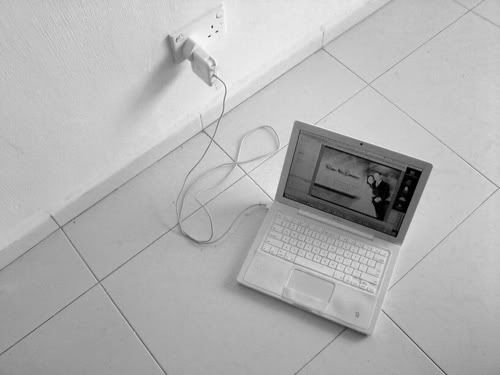Saturday, October 06, 2007
what you won't read on our straits times.
--
Singapore, a friend indeed to Burma junta
Eric Ellis
1 October 2007
The Sydney Morning Herald
C 2007 Copyright John Fairfax Holdings Limited. www.smh.com.au
[http://www.smh.com.au]
The island-state may have much to lose if Burma's generals don't retain
control, writes Eric Ellis.
SINGAPORE is not just skilled at mandatory executions of drug traffickers,
running an excellent airport and selling cameras on Orchard Road. It also
does a very useful trade keeping Burma's military rulers and their cronies
afloat.
Much attention is focused on China and its hosting of the Olympic Games next
year as a diplomatic trigger point for placing pressure on Burma's junta.
But there is a group of government businessmen-technocrats in Singapore who
will also be closely - and perhaps nervously - monitoring the brutality in
Rangoon. Were they so inclined, their influence could go a long way to
limiting the misery being inflicted on Burma's 54 million people.
Collectively known as Singapore Inc, they gather around the $150 billion
state-owned investment house Temasek Holdings, controlled by Singapore's
long-ruling Lee family. With an estimated $3 billion invested in Burma (and
more than $20 billion in Australia), Singapore Inc companies have been some
of the biggest investors in and supporters of Burma's military junta - this
while its Government, on the rare times it is asked, gently suggests a
softly-softly diplomatic approach toward the junta.
When it comes to Burma, Singapore pockets the high morals it likes to wave
at the West.
Singapore's one-time head of foreign trade said, as his country was building
links with Burma in the mid-1990s: "While the other countries are ignoring
it, it's a good time for us to go in. You get better deals, and you're more
appreciated. Singapore's position is not to judge them and take a judgmental
moral high ground."
But by providing Burma's pariah junta with crucial material and equipment
mostly denied by Western sanctions Singapore has helped keep the military
government and its cronies afloat for 20 years, indeed since the last time
the generals killed the citizens they are supposed to protect with
industrial efficiency and brutality, as now.
Without the support from Singapore, Burma's junta would be greatly weakened
and perhaps even fail. But after two decades of profitable business with the
generals and their cronies, that is about the last thing Singapore Inc is
likely to do. There's too much money to be made.
From hotels, airlines, military equipment and training, crowd control
equipment and sophisticated telecommunications monitoring devices, Singapore
is a crucial manager and supplier to the junta, and Burma's economy.
It is impossible to spend any meaningful time in Burma and not make the
junta richer, via contracts with Singapore suppliers to the tourism
industry. Singapore's hospitals also keep its leaders alive - the
74-year-old strongman Than Shwe has been receiving treatment for intestinal
cancer in a government hospital in Singapore, in a ward heavily protected by
Singapore security.
Much of Singapore's activity in Burma has been documented by an analyst
working in Australia's Office of National Assessments. Andrew Selth is
recognised as a leading authority on Burma's military. Now a research fellow
at Queensland's Griffith University, Selth has written extensively for years
on how close Singapore Inc is to the junta.
Often writing as "William Ashton" in Jane's Intelligence Review, Selth has
described how Singapore has sent guns, rockets, armoured personnel carriers
and grenade launchers to the junta, some of it trans-shipped from stocks
seized by Israel from Palestinians in southern Lebanon.
Singaporean companies have provided computers and communications equipment
for Burma's defence ministry and army, while upgrading the junta's ability
to communicate with regional commanders - so crucial as protesters take to
the streets of 20 cities in Burma. The sheer scale of the protests is
causing logistical headaches for the Tatmadaw, as Burma's military is known.
"Singapore cares little about human rights, in particular the plight of the
ethnic and religious minorities in Burma," Selth writes. "Having developed
one of the region's most advanced armed forces and defence industrial
support bases, Singapore is in a good position to offer Burma a number of
inducements which other ASEAN [Association of South-East Asian Nations]
countries would find hard to match."
Selth says Singapore also provided the equipment for a "cyber war centre" to
monitor dissident activity, while training Burma's secret police, whose sole
job appears to be ensuring democracy groups are crushed.
Monitoring dissidents is an area where Singapore has expertise. After almost
five decades in power, the Lee family-controlled People's Action Party ranks
behind only the communists of China, Cuba and North Korea in leadership
longevity.
"This centre is reported to be closely involved in the monitoring and
recording of foreign and domestic telecommunications, including the
satellite telephone conversations of Burmese opposition groups," Selth
writes.
Singaporean government companies, such as the arms supplier Singapore
Technologies, dominate the communications and military sector in Singapore.
Selth writes: "It is highly unlikely that any of these arms shipments to
Burma could have been made without the knowledge and support of the
Singapore Government." He notes that Singapore's ambassadors to Burma have
included a former senior Singapore Armed Forces officer and a past director
of Singapore's defence-oriented Joint Intelligence Directorate. "It is
curious that Singapore chose to assign someone with a military background to
this new member of ASEAN and not one of its many capable professional
diplomats."
Selth writes that after Burma's 1988 crackdown, in which 3000 democracy
protesters were killed, "the first country to come to the regime's rescue
was in fact Singapore".
In an interview with the chief executive officer of Singapore Technologies,
Peter Seah, at his office in Singapore, the Herald asked about the model of
an armoured personnel carrier made by his company that sat on his office
table. Seah said his company sold the vehicles "only to allies". Did that
include Burma, given Singapore helped sponsor the military regime into
ASEAN? Seah was not specific: "We only sell to allies and we make sure they
are responsible." He did not say how. For its part, Temasek does not respond
to questions about its activities in Burma.
A Singaporean diplomat to Burma, Matthew Sim, wrote a handbook for
Singaporean businesspeople, Myanmar on My Mind. It is full of tips for doing
business in Burma, although odd given Singapore's contempt for corruption
and lawbreakers. "A little money goes a long way in greasing the wheels of
productivity," he writes.
A chapter headed Committing Manslaughter When Driving describes the
appropriate action for a Singaporean if they accidentally kill a pedestrian
in Burma. "Firstly, the international businessman could give the family of
the deceased some money as compensation and dissuade them from pressing
charges. Secondly, he could pay a Myanmar citizen to take the blame by
declaring that he was the driver in the fatal accident. An international
businessman should not make the mistake of trying to argue his case in a
court of law when it comes to a fatal accident, even if he is in the right.
He highly probably will spend time in jail regretting it. It is a sad and
hard world. The facts of life can be ugly."
Describing Singapore's usefulness to Burma, Sim says "many successful
Myanmar businessmen have opened shell companies" in Singapore "with little
or no staff, used to keep funds overseas". The companies are used to keep
business deals outside the control of Burma's central bank, enabling
Singaporeans and others to make transactions with Burma in Singapore, he
says.
Sim may be referring to junta cronies such as Tay Za and the druglord Lo
Hsing Han. Lo is an ethnic Chinese, from Burma's traditionally
Chinese-populated and opium-rich Kokang region in the country's east,
bordering China. Lo controls a heroin empire and one of Burma's biggest
companies, Asia World, which the US Drug Enforcement Agency describes as a
front for his drug trafficking. Asia World controls toll roads, industrial
parks and trading companies.
Singapore is the Lo family's window to the world, a base for controlling
several companies. Lo's son Steven, who has been denied a visa to the US
because of his drug links, is married to a Singaporean, Cecilia Ng. The two
reportedly control a Singapore-based trading house, Kokang Singapore Pty
Ltd. The couple transit Singapore at will. A former US assistant secretary
of state for the Bureau of International Narcotics and Law Enforcement
Affairs, Robert Gelbard, has said half of Singapore's investment in Burma
has been "tied to the family of narco-trafficker Lo Hsing Han".
Tay Zar, who is linked romantically to a daughter of Than Shwe, is also well
known in Singapore. His fleet of Ferrari, Lexus and Mercedes cars was
shipped to Burma from Singapore. When on the island, he likes to stay at the
tacky Meritus Mandarin hotel on Orchard Road, close to the hospitals
favoured by his senior military patrons from Burma.
Tay Za was featured in the Singaporean media last year toasting the launch
of his new airline, Air Bagan, with the head of Singapore's aviation
authority. Dissident groups say the trade-off for Tay Za's government
business contracts in Burma is to fund junta leaders' medical trips to
Singapore.
So when the Australian Prime Minister, John Howard, vows to impose financial
sanctions on Burma's regime, as he did this week, perhaps he should be
calling Singapore's bankers rather than Australia's.
Friday, October 05, 2007
i love this place




----joraffe----

